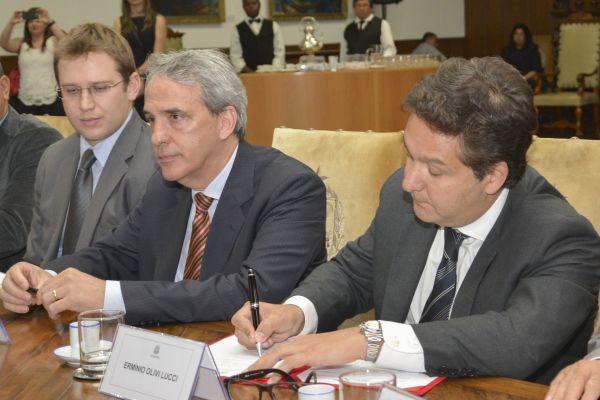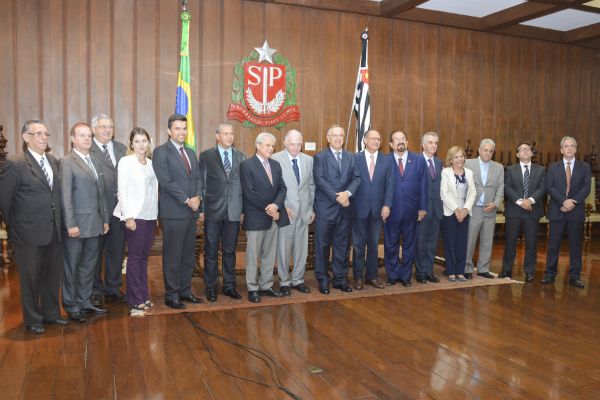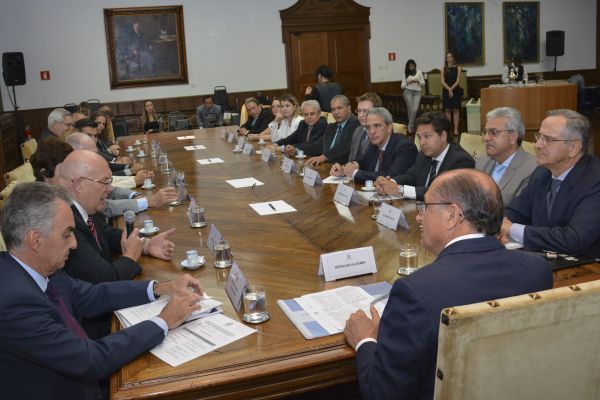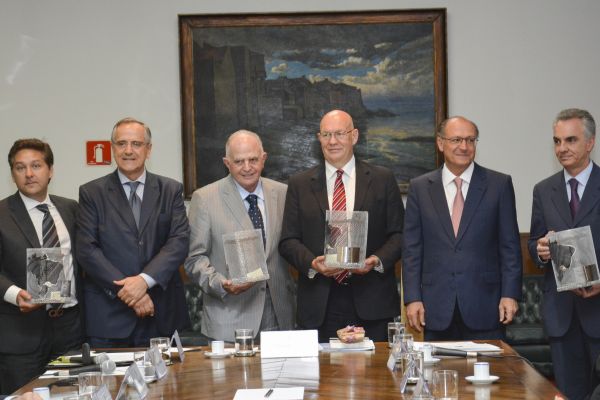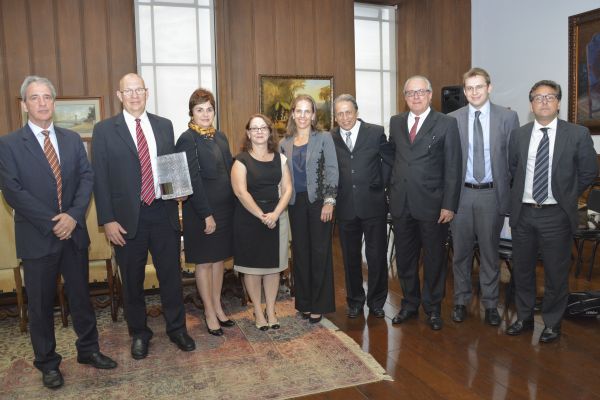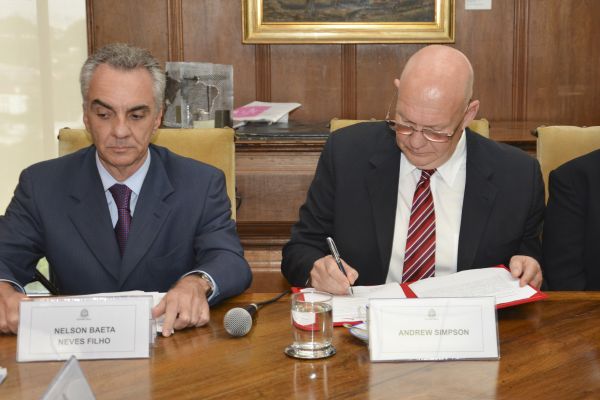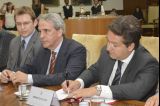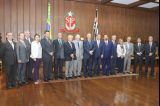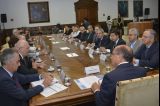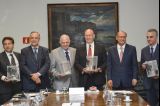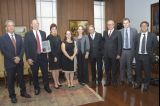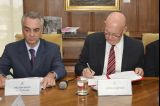Orygen and Investe SP enter into a Memorandum of Understanding for a plant in São Carlos
Document signed at Palácio dos Bandeirantes confirms the state commitments with the company; Municipality amends law and transforms the area chosen from rural to industrial
Investe São PauloOn September 29, Investe São Paulo and Orygen, a joint venture between the laboratories Biolab and Eurofarma, entered into a Memorandum of Understanding confirming the construction of a plant of biosimilar drugs in São Carlos, 250 km from the state capital. The document was signed at a meeting with the governor of the state of São Paulo, Geraldo Alckmin, held at the Palácio dos Bandeirantes.
On the occasion, a memorandum of intent was also entered into between the municipality and the company. The municipality also submitted to Orygen the law approved by the City Council amending the area chosen from rural to industrial, a condition that had been included as essential to the viability of the investment.
“The land of work is here. In São Paulo, people are fulfilled by being able to work and produce; for this reason, we are partners with those who invest in the state. Count on us in this partnership,” said Alckmin.
Investe SP, an investment promotion agency associated with the Department of Economic Development, Science, Technology and Innovation, supported Orygen mainly in the dialogue with state institutions and public utilities. The memorandum signed with the company aims to confirm the continuous support of the institution in the implementation phase of the future plant.
“The nationalization of biosimilar drugs is a historical moment not only for the state but for the country, as it will reduce the trade deficit in this sector and facilitate the availability of important drugs in the SUS (Unified Health System). Entering into this Memorandum of Understanding and bringing this project to the state makes us very proud,” said the director of Investe SP, Erminio Lucci.
The plant will be built on an area covering 200,000 square meters. Once the construction of the production plant of Orygen is completed, the company plans to start operating with a total of 110 professionals, 50 of whom will be directly involved with the technical processes, 28 in the production lines, 20 in control and quality assurance and 12 in operational support activities. It is estimated that more than a third of all professionals are masters and PhDs.
“Orygen chose a city with all the necessary features for the project. São Carlos relies on technology parks registered in our SPTec (São Paulo Technology Parks System), research centers, universities, among them USP (Universidade de São Paulo), and workforce directed for the pharmaceutical industry,” said the Secretary of Economic Development, Science, Technology and Innovation, Nelson Baeta Neves Filho.
Monoclonal antibodies are produced by living cells and the clinical and commercial success of these biological agents is transforming the global pharmaceutical industry. As the patents of these drugs expire, substantial opportunities emerge for the production of highly similar versions of these biological agents, called biosimilars. The interest in developing biologicals and biosimilars in Brazil has been incremented by the possibilities offered with the expiration of the patents in the upcoming years.
For the implementation of the project, Orygen entered into a strategic partnership with Pfizer Inc., whose collaboration agreement is under analysis by the Administrative Council of Economic Defense (Cade). After the approval of the agreement and the execution of ancillary covenants, Pfizer will initiate the process of technology transfer for the production of up to five monoclonal antibodies to Orygen, which include the biosimilars Adalimumab, Bevacizumab, Infliximab, Rituximab and Trastuzumab used to fight diseases such as cancer and autoimmune diseases.
For the construction of the plant, Orygen relies on the support of the National Bank for Economic and Social Development (BNDES) and the Financier of Studies and Projects (FINEP). The plant is expected to start operating in 2017, with the first drugs coming out of the plant in 2018.
According to the scientific director of Orygen, the English biochemist Andrew Simpson, Pfizer is at an advanced stage in the development of these drugs. “The availability of Pfizer’s antibodies in Brazil to be distributed by SUS will bring a huge gain to patients with diseases that can be treated with these antibodies,” he said.
According to the city’s mayor, Paulo Altomani, “the investment of Orygen will be very important for the economy and the health of the city, in addition to generating many jobs. This is a high technology company that, with the authorization of Pfizer, will produce antibodies for the treatment of cancer and arthritis. São Carlos is a developed city in the area of medicine,” he said.
The event was also attended by the directors Luiz Monteiro and Otavia Caballero, from Orygen, and the authorities of São Carlos: The Municipal Secretary of Sustainable Development, Science and Technology, Alfredo Colenci Junior; the Municipal Secretary of Housing and Urban Development, Lauanna Campagnolli, the president of SAEE Sérgio Pepino and the city councilors Cidinha do Oncológico, Dé Alvim, Rodson Magno, Roselei Françoso and Lucão Fernandes.
Strategy
It has been two years since Orygen first intended to build a drug plant in Brazil, and the partnership with Pfizer was fundamental for the implementation of this project.
The production of biosimilar drugs is strategic for the Brazilian government, which currently imports the drugs to be distributed in the Unified Health System (SUS). Since 2012, the Ministry of Health has been discussing agreements with several Brazilian companies for the nationalization of these products with support from BNDES.
The idea would be to reduce the trade deficit of medical equipment and medicines, which is approximately R$ 25 billion per year.
Biolab and Eurofarma
Orygen is an joint venture integrated by the founding partner companies, Biolab Sanus Farmacêutica Ltda. and Eurofarma Laboratórios S.A., each one holding 50% stake.
Biolab has two manufacturing units in the State of São Paulo, in Jandira and Taboão da Serra, with production lines for oral solids, semi-solids and injectables, hormonal and nonhormonals, packaging lines, areas of utilities and wastewater treatment. The administrative center is located in the city of São Paulo, with an RD&I unit (Research, Development and Innovation) in Itapecirica da Serra, São Paulo, and another in the CIETEC (Innovation, Entrepreneurship and Technology Center) of the Energy Research Institute of USP, where it models and synthesizes new molecules (radicals and semi-radicals).
The company hires approximately 1,900 employees, with 1,000 working in the sales force and commercial area, according to data from December/2012. The company is focused on prescription drugs in the specialties of cardiology, gynecology, rheumatology, orthopedics, internal medicine, pediatrics, endocrinology, geriatrics and dermatology. Following a worldwide trend, the company also invests in skin care products, developing products considering the different types of weather in the country, the skin type of Brazilians and the natural resources available in the national biodiversity.
Eurofarma is today among the largest pharmaceutical companies of 100% national capital, operating in major pharmaceutical segments of medical prescription, generic drugs, OTC, hospital, oncology, veterinary and services to third parties. Eurofarma is the second most prescribed brand in the country. The company hires over 5,700 employees and is present in Brazil and in 14 Latin American countries (Argentina, Uruguay, Chile, Bolivia, Colombia, Peru, Guatemala, Panama, Honduras, Nicaragua, El Salvador, Costa Rica, Belize and the Republic Dominican). The company’s vision is to cover 90% of the Latin American market by 2015.
Eurofarma reported growth in 2012 and 2013. The company’s consolidated gross revenue reached the milestone of R$ 1.9 billion, which is equivalent to a 15.1% increase in comparison with the previous year. The consolidated EBITDA increased 47.9% compared to 2011, totaling R$ 325.1 million, or 19.8% of the value creation, measured over the net revenue. This was the result of the intense work, not yet completed, improvements in the cost structure in the division of hospital sera, maintenance of fixed expenses and improvements in the performance of subsidiaries.

